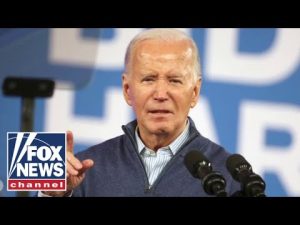In the world of contemporary politics, few stories capture the absurdity and dramatic irony of our time quite like the saga of Donald Trump and the so-called “Russian collusion.” For years, this grand tale has unfolded, painting the former president as the victim of an elaborate scheme cooked up by the deep state’s elite. And now, as revealed in recently declassified documents, it turns out that the meddling of foreign powers in the 2016 election was overstated to destabilize one man’s presidency, and ultimately, to undermine the will of the American electorate.
On Trump’s first day in office, he signed an executive order asserting that the federal government would take necessary actions to rectify past misconduct, specifically regarding the weaponization of law enforcement and the intelligence community. As if foreshadowing a movie plot twist, it now appears that the so-called “Russia hoax” investigation that marred his presidency from day one was rooted in misinformation. A newly declassified report intended for President Obama in December 2016 purportedly acknowledged that Russian activity had not impacted the election outcome, yet this finding was never acted upon.
The story dives into the murky waters of America’s political deep state, where career intelligence officers and political appointees found themselves at odds. Not unlike a spy novel, the assessment prepared by honest career people was reportedly shelved before President Obama could even review it. Instead, those perched at the power top, apparently dissatisfied with reality, turned verified intelligence into fiction while setting the stage for three years of finger-pointing that culminated in multiple investigations and two impeachments.
The emergence of this revelation naturally redoubles the skepticism some hold towards entrenched political and bureaucratic structures. There was reportedly an intentional effort within the Obama administration’s senior ranks, with figures such as James Comey, John Brennan, and others, to construct a narrative sewing the seeds of doubt regarding President Trump’s legitimacy. This undertaking not only strained U.S.-Russia relations but also led to harsh political and personal ramifications for Trump and his associates.
The consequences of this alleged orchestration are many. Apart from subjecting Trump’s administration to persistent turbulence, taxpayers faced a hefty bill for the investigative proceedings, and public trust in American institutions sustained severe damage. As fervor for “accountability” grows, what remains to be seen is whether justice will genuinely be served against those who purportedly sought to overturn an election’s outcome for political advantage.
The documents released certainly bolster the call for transparency and a thorough investigation into these accusations. However, whether this dramatic episode’s final act includes legal repercussions for those involved remains uncertain. What is clear is the need for a vigilant and informed public to safeguard democracy from such potential abuses of power. The saga uncovers timeless lessons of political caution, spotlighting the importance of integrity and diligence in national discourse and governance.







